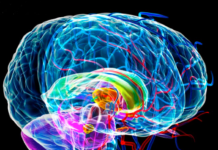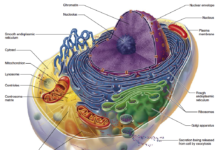Menopause marks the end of a woman’s menstruation and her reproductive lifespan. It usually occurs between the ages of 35 and 55. The hormonal changes that occur before and after the cessation of ovulation and menstruation are thought to reflect the aging process. Imbalances in the hormonal interplay between the hypothalamus, the pituitary, and the ovaries cause the many, varied symptoms that make up the menopausal syndrome. These include irregular cycles, missed periods, hot flashes, night sweats, palpitations, emotional fragility and depression, headaches, memory loss, insomnia, loss of libido, vaginal dryness, dry skin.
However, these same alterations in hormonal chemistry are also felt to contribute to the major disorders of aging for women – the atherosclerosis underlying heart disease and stroke and the loss of bone mass leading to osteoporosis and increased rates of bone fracture.
When passing through menopause, the ovaries lose ability to produce estrogen and progesterone. The hypothalamus tries to adjust for this loss by temporarily increasing levels of follicle stimulating hormone [FSH] and luteinizing hormone [LH], hormones that stimulate estrogen production. Also, the adrenal glands and fat cells take over some level of estrogen production. Many women pass through this period of adjustment with few symptoms.
However, menopausal syndrome is epidemic among American women because a number of contributing factors keep the varied regulating hormones in imbalance:
- Stress from overwork
- Poor nutrition
- Lack of exercise
- Excessive intake of synthetic hormones from animal foods
- Excessive exposure to chemical pollutants
- Eating disorders including anorexia and bulimia
- Surgical removal of the uterus and ovaries
Herbal Support for Menopause
Chinese herbal formulas have been shown to aid in alleviating many of the concerns women have when passing through menopause, including:
- Uncomfortable symptoms that arise as the ovaries lose function;
- Increased risk of heart disease that accompanies declining estrogen production, and;
- Accelerated loss of bone density that occurs after cessation of menstrual periods
A number of studies have shown that advanced herbal formulas can aid in improving the function of the glands and organs that control ovulation and menstruation, and by enhancing blood circulation.
In one study carried out at the Shanghai Center for Modern Traditional Chinese Medicine Technology, 50 women with menopausal syndrome were treated with an advanced herbal formula. Their ages ranged from: 44 – 60 years. Their symptoms included various levels of anxiety, emotional instability, headache and dizziness, tinnitus and blockage of hearing, oppressive sensations of the chest, palpitations, restlessness, anger, hot flashes, spontaneous sweating, aching of the legs and low back, uncontrollable crying, and depression.
After taking the formula (shortest administration period, 1 month; longest, 3 months), 30 patients experienced complete relief of symptoms, 13 experienced marked improvement, and three some improvement. Of the patients with complete relief of symptoms, none of the symptoms had returned six months after discontinuation of treatment.
In a second study the same formula was evaluated in both men (68) and women (82) as a treatment for neurasthenia. Neurasthenia is a disorder of nervous exhaustion that shares many symptoms with menopausal syndrome, including depression, irritability, lack of focus, memory loss, insomnia and dream-disturbed sleep, dizziness and headache, limb pain, and various autonomic nervous system disorders. After three months of administration of the formula, 75 cases had fully recovered, 48 patients experienced marked improvement, 16 were noted as improved and 11 cases gained no improvement.
A third study looked at the use of the formula in treating angioneurotic headaches. Angioneurotic headaches are characterized by spasms of the blood vessels resulting from disturbances of the vasomotor system. Of the 84 patients in the study, 68 were female and 16 male ranging in age from 17 to 52 years. They experienced 1+ headache per month with an average duration of the condition of 2.5 years. The headaches were experienced as frontal, bilateral, vertex, or occipital with throbbing, distending, pounding, or stabbing pain. Accompanying symptoms included light-headedness, irritability, insomnia, irregular menses in the female patients, and depression.
After a course of treatment with the formula, 54 cases experienced recovery in which all symptoms disappeared, rheoencephalogram readings improved indicating normalization of blood vessel tension, and there was no recurrence of headache one year later. 25 patients experienced improvement in which headaches and other symptoms disappeared and headache returned three months after treatment. Only 5 cases experienced no improvement.
Physiological Actions of Chinese Herbs for Menopause
According to Subhuti Dharmananda in his paper The Endocrine Effect of Chinese Medicine, “Chinese herbs act by stimulating the production of hormones, altering the condition of hormone receptors or changing the rate of catabolism of hormones, rather than by providing the hormones or hormone analogs that function the same as hormones.”
In the case of the formula used in the study above, pharmacodynamic studies in animals revealed that it is capable of markedly increasing the estrogen receptor levels of the pituitary gland, hypothalamus, and ovaries in aged rats.While this ability of formula to increase glandular estrogen receptor levels is a likely contributor to its efficacy, the formula is also affecting the autonomic nervous system.
Hot flashes, the most common menopausal symptom, are due to instability of the brain’s relay system, its neurotransmitters, which are affected by the lowered levels of estrogen in the blood stream as menopause progresses. This instability affects our autonomic nervous system (ANS). It is the ANS that is responsible for our body’s thermostatic control, contraction and dilation of the blood vessels and skin pores, perspiration, and other automatic physiological responses of our body.
The apparent ability of the formula to reduce hot flashes and angioneurotic headaches indicates that it has a positive impact on neurotransmitter function in regulating the hypothalamic, pituitary, ovarian homeostat.
Chinese Herbs for Improved Blood Circulation
The advanced herbal formula was been found to improve the blood circulation of the heart and brain by promoting vessel dilation and inhibiting the clumping of red blood corpuscles, thus increasing blood flow. Numerous animal studies indicate that the nutrient combination in the formula improved microcirculation in the capillaries, inhibited formation of thromboxane A2 to aid in prevention of blood clots, and reversed platelet aggregation and elevations of blood and plasma viscosity. Other animal studies have found that this formula stimulates a protective mechanism against heart muscle cell deterioration.
All of the benefits of improved blood flow including improved vessel dilation and lowered viscosity should be of great benefit to women following menopause who regularly ingest the ingredients in the formula. This improved blood flow will also have an additional benefit in preserving the function of the organs and glands that determine healthy endocrine function as women age.
Chinese Herbs for Osteoporosis
Improved blood flow can also make a positive contribution to the prevention of bone loss in postmenopausal women. After menopause, bone loss accelerates for 3-5 years, at a rate of from 1.5% to 5% per year. Bone loss then continues at a lower level of around 1% to 1.5% loss per year on average.
The herbs in the advanced Chinese formula are central to the restoration of blood flow and bone mass density in this condition. Angelica sinensis and cordyceps are thought to be the chief herbs that assist in this disorder and are central herbs in the formula. While it diminishes symptoms of menopausal syndrome, the formula should also provide women with protection against osteoporosis.
Chinese Herbs for Avascular Necrosis of the Femoral Head (AVN)
Six of the ten herbs in the formula under discussion are commonly used in China in the treatment and reversal of Avascular Necrosis of the femoral head (AVN), a severe disorder in which the head of the femur at the hip collapses from a lack of blood flow that leads to destruction of bone tissue. AVN is commonly a result of chronic use of corticosteroid therapy, and usually progresses to joint, requiring total hip replacement (THR). It is estimated that almost 10% of the nearly 500,000 total hip replacement surgerys performed each year in the United States are intended to treat AVN, at a cost of more than 1 billion dollars, accounting for approximately 25% of the total national costs for THR.
Chinese Herbal Formula for Daily Use
Clinical trials indicate that the formula is capable of effecting regulatory changes of the endocrine and circulatory systems such that many of the signs of aging, including those of menopause are either ameliorated or even alleviated.
The formula can be taken by women at the earliest signs of changes that indicate the approach of menopause to ease them through the transition with minimal symptoms. After menopause, the formula can be taken regularly to continue to assist in maintaining optimal endocrine, circulatory and skeletal health.
Select Chinese Herbs for Menopause
Angelica Sinensis (Dang Gui)
Traditional actions and indications: Nourishes the blood, promotes the flow of blood, regulates the menses, relieves pain, moistens the intestines and relieves constipation. Clinical effects: Improves microcirculation and vessel dilation, thus increasing blood flow rate and preventing hemagglutination. Helps control serum cholesterol. Has calming, pain relieving, and anti-inflammatory effects.
Sichuan Lovage (Chuan Xiong)
Clinical effects: Has vessel dilation and anti-platelet agglutination effects. Major constituent is capable of penetrating the blood-brain barrier and being stored in the brain stem, thus improving the dilation-contraction function of the blood vessels of the brain. Has sedating and pain relieving effects; alleviates spasms; has antihypertensive effect.
Red Sage Root (Dan Shen)
Clinical effects: Improves microcirculation and thus blood flow, promotes the establishment of collateral blood vessels. Promotes tissue repair and regeneration, inhibits overproliferation of fibrous cells. Has sedating effect.
San-Qi Ginseng (shen-san-qi)
Clinical effects: Contains more ginsenosides than ginseng; alleviates fatigue, has an overall strengthening effect. Strengthens the heart; reduces myocardial oxygen consumption; dilates the vessels; reduces artery pressure; raises coronary blood flow.
Safflower Flower (Hong Hua)
Clinical effects: Improves bone marrow function; accelerates red blood cell production, has excitatory effect on smooth muscle of the intestines, blood vessels, and bronchi, dilates the coronary artery, relieves angina pectoris, improves low cardiac output.
Achyranthes (Huai-niu-xi)
Clinical effects: Has mild antiperistalsis effect on the stomach and intestines. Has sedating effect; has antihypertensive effect; promotes urination.
Trifoliate Orange (zhi-ke)
Clinical effects: Raises blood pressure during which blood flow through the coronary artery, brain, and kidneys is increased, alleviates allergic reactions by inhibiting the release of anaphylaxin.
Cordyceps (Dong Chong Xia Cao)
Clinical effects: Increases immunity, lowers total serum lipid levels, thus alleviating the formation of atheromatous lesions, and has sedating and sleep-promoting effects.
Peach Kernal (Tao Ren)
Clinical effects: Reduces menstrual pain, abdominal pain, trauma pain, moistens the intestines to lessen constipation.
Balloon Flower root (platycodon)
Clinical effects: Stops cough, promotes the discharge of puss, soothes sore throat, and directs the effects of other herbs to the upper body.














[…] Chinese herbal formulas are also fantastic for treating symptoms. The best thing about Chinese herbal formulas are that they are tailor made for the patient. So depending on your symptoms and what your […]
This article is great, and encouraging … and intensely frustrating and quite cruel, because it leaves the central question unanswered: WHAT WAS THIS MAGICAL FORMULA?!
“You can cure yourself of this dreadfulness, we promise … but no we won’t tell you how, nor even provide study references so you have a chance to find out for yourself.”
A list of herbs is nice, but what is the actual formula proven in these studies please? So frustrating to read this otherwise good article!
Lily, the formula you’re referring to is available here: https://www.tangoherbs.com/femmephase.html